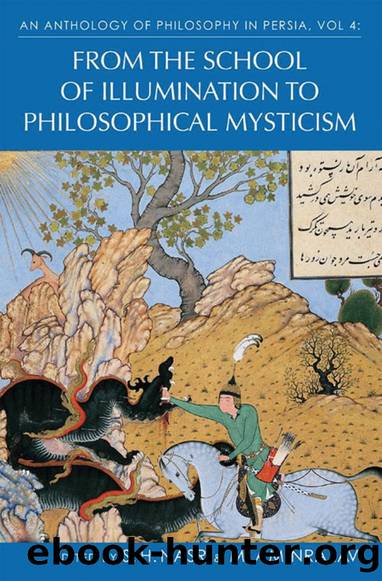An Anthology of Philosophy in Persia: Vol. 4 by S.H. Nasr

Author:S.H. Nasr [Nasr, S.H.]
Language: eng
Format: epub
ISBN: 9781299640245
Goodreads: 18543133
Publisher: Bloomsbury UK
Published: 2019-04-15T00:00:00+00:00
* * *
1. QazwÄ«nÄ«âs objection is based on the idea that being cannot be added to quiddities otherwise we would have to accept that quiddities exist before existence is added to them. âBlackness with existenceâ added to it and non-existence illustrates this point: when âexistence as added to blacknessâ is removed from it, blackness (or any black object) must cease to exist rather than becoming âblackness without existence added to it.â This is another way of stating the logical impossibility of existence as an accident.
2. Being is a common term (mafhūm mushtarak) among actually existing substances but not a genus or species because whereas a genus or species by definition applies only to a definite number of objects, being, as the all-inclusive reality of all things, cannot include certain things and leave out others. Such logical terms as genus and species apply to the order of thought, not the order of being.
3. The commentator Shams al-DÄ«n Muḥammad ibn MubÄrak-ShÄh al-BukhÄrÄ« notes that this is âin contrast to the MuÊ¿tazilites and the majority of the AshÊ¿arites.â
4. God is identical with His Essence because there is no distinction between His Essence and Existence. We can explain this as follows. Essence or quiddity, which I use to translate mÄhiyyah, is that which makes a thing what it is. Now, no finite and contingent being is completely identical with its quiddity because quiddities are by definition shared by other individual beings. Zaydâs quiddity, for instance, is âbeing humanâ or simply humanity. But other individuals share the quiddity of humanity just like Zayd. Furthermore, Zayd as a human being has many accidents such as walking and laughing, which are not part of his quiddity. In other words, Zayd has certain attributes besides his quiddity. Therefore Zayd is less than his quiddity (humanity), on the one hand, because others partake of it but more than his quiddity, on the other hand, because he always co-exists with accidents outside his quiddity. While this holds true for all contingent beings, it does not for God because nothing other than God can share His quiddity. In other words, God is the only instance of His kind. Furthermore, God has no accidents because He subsists by Himself. In other words, He is necessary-by-itself (wÄjib bi-dhÄtihi). In this sense, God cannot have accidents because accidents may exist in different substances. Accidents may or may not depend for their existence on their substratum whereas in the case of God, nothing is caused by anything other than Himself. This somewhat difficult yet central doctrine of Islamic philosophy is shared by medieval Western philosophy. Thomas Aquinas advances similar proofs for the identification of God with His Essence. See his Summa Theologica, Part I, Question 3, Articles 3â6.
1. Literally âbenefitsâ (al-mufÄ«d). Like the grammatical expression in Arabic âcomplete sentenceâ (jumlah mufÄ«dah), that which completes being (al-mufÄ«d liâl-wujÅ«d) expresses the idea of the completion of actually existing substances.
1. Despite the difficulty of QazwÄ«nÄ«âs text, the issue at hand is clear enough: if Godâs Being is identical
Download
This site does not store any files on its server. We only index and link to content provided by other sites. Please contact the content providers to delete copyright contents if any and email us, we'll remove relevant links or contents immediately.
| Hadith | History |
| Law | Mecca |
| Muhammed | Quran |
| Rituals & Practice | Shi'ism |
| Sufism | Sunnism |
| Theology | Women in Islam |
The History of Jihad: From Muhammad to ISIS by Spencer Robert(2628)
Nine Parts of Desire by Geraldine Brooks(2368)
The Turkish Psychedelic Explosion by Daniel Spicer(2356)
The First Muslim The Story of Muhammad by Lesley Hazleton(2271)
The Essential Rumi by Coleman Barks(2046)
1453 by Roger Crowley(2030)
The Last Mughal by William Dalrymple(1857)
Trickster Travels: A Sixteenth-Century Muslim Between Worlds by Davis Natalie Zemon(1847)
Muhammad: His Life Based on the Earliest Sources by Martin Lings(1646)
God by Aslan Reza(1641)
by Christianity & Islam(1632)
A Concise History of Sunnis and Shi'is by John McHugo(1567)
No God But God by Reza Aslan(1545)
Magic and Divination in Early Islam by Emilie Savage-Smith;(1534)
The Flight of the Intellectuals by Berman Paul(1503)
Nothing to Envy by Barbara Demick(1450)
Art of Betrayal by Gordon Corera(1430)
What the Qur'an Meant by Garry Wills(1394)
Getting Jesus Right: How Muslims Get Jesus and Islam Wrong by James A Beverley & Craig A Evans(1342)
